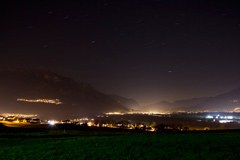News
Liechtenstein switches the lights out
Jan 25, 2012
/
alpMedia
The first state in the world to go dark: in January and February Liechtenstein is conducting experiments in bird protection, energy efficiency and public safety.

Image caption:
Liechtenstein: nocturnal lighting means that only 500 stars can be seen, whereas complete darkness would make up to 2,000 visible. © Paul Trummer
In the first two months of 2012 each municipality in Liechtenstein is switching off around one third of its street lights. In three of the eleven municipalities only certain main streets will be lit between the hours of 0030 and 0530, while in Planken all the lights are being switched off. Some two years ago the first municipalities introduced a night-time lights-out policy and, if the experiment is a success, in future the whole country will be switching out the lights.
Lighting at night accounts for approximately one third of the public electricity bill. A survey showed that 67 per cent of Germans approved of switching off lights in order to save energy. The night-time switch-off in Liechtenstein is also a matter of environmental protection, as the Alpine section of the Rhine Valley is an important route for migratory birds. They largely fly at night and are disoriented by lights. Nor do the reduced lighting levels involve a risk to people: Liechtenstein police confirm the experience of the German city of Rheine, namely that crime does not increase. Rheine has been switching its lights out since 2005.
People in South Tyrol may also soon being seeing more stars at night: the provincial administration decided in December 2011 that the municipalities must within one year submit a plan for reducing light pollution between 0100 and 0600.
Source and further information: www.lgu.li/artikel (de), www.provinz.bz.it/lpa/285.asp?art=382266 (de) www.lichtblick.de/h/medien_358.php?id_rec=221 (de)
Lighting at night accounts for approximately one third of the public electricity bill. A survey showed that 67 per cent of Germans approved of switching off lights in order to save energy. The night-time switch-off in Liechtenstein is also a matter of environmental protection, as the Alpine section of the Rhine Valley is an important route for migratory birds. They largely fly at night and are disoriented by lights. Nor do the reduced lighting levels involve a risk to people: Liechtenstein police confirm the experience of the German city of Rheine, namely that crime does not increase. Rheine has been switching its lights out since 2005.
People in South Tyrol may also soon being seeing more stars at night: the provincial administration decided in December 2011 that the municipalities must within one year submit a plan for reducing light pollution between 0100 and 0600.
Source and further information: www.lgu.li/artikel (de), www.provinz.bz.it/lpa/285.asp?art=382266 (de) www.lichtblick.de/h/medien_358.php?id_rec=221 (de)


